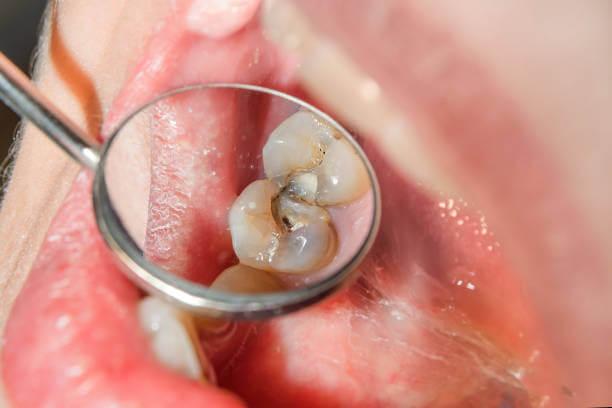
Feeling discomfort in your teeth but unsure of the cause? The pain might not just be random, it could be a dental issue such as a cavity. Cavities rank as one of the most frequent dental problems globally.
Understanding what a cavity feels like can be the first step in getting timely treatment.
This article looks into the signs, sensations, and experiences tied to cavities, from subtle discomfort to more distinct sensations, causes, and treatments.
A dental cavity is essentially a hole in the tooth caused by decay. The tooth is composed of multiple layers: the outermost layer is enamel, beneath which lies the dentin, and at the core is the pulp, which contains nerves and blood vessels.
When food particles and plaque are not adequately removed from the teeth, bacteria in the mouth break them down and produce acids. These acids then weaken the enamel, leading to decay and eventually forming a cavity.
To understand why cavities form in teeth, it's important to look at several contributing factors. The following is a list of some of the most prevalent variables that contribute to the formation of cavities:
If you have an in-depth understanding of these elements, you will be better prepared to take preventative action against cavities, thereby guaranteeing dental health that is in excellent condition.
You can be more proactive in the care you provide for your teeth by being familiar with the many forms of cavities. Here’s a straightforward guide to categorizing cavities based on their location and stage of development:
Interproximal cavities often remain hidden until identified by X-rays during a dental visit. They form between teeth and typically don't cause pain or discomfort in their initial stages.
These cavities develop in the grooves of the molars' chewing surfaces. In their early stages, they may trap food particles.
In the very beginning, a cavity might not present any symptoms. There's often no pain or noticeable sensitivity.
As cavities grow, they can lead to sensitivity when exposed to hot or cold temperatures or when consuming sweet or acidic foods.
When cavities reach an advanced stage, they can cause continuous pain. This pain can be intense, affecting the gums or causing an abscess.
Cavities can develop in different locations and progress through various stages, each with its own symptoms. Regular dental check-ups are essential for early identification and effective treatment.
When you're wondering what a cavity feels like, it's important to realize that everyone's experience can be different. However, there are some common symptoms that people often describe. Let's delve into the various sensations you might encounter when you have a cavity.
Tooth sensitivity is often one of the first signs of tooth problems. You may find that your teeth are more sensitive to temperature changes or certain food and drink types, like sweets.
If you bite into something and feel an aching pain that lingers for a while, that could also be a symptom of a cavity. The pain can be triggered by biting down or applying pressure to the tooth, and it could indicate that the cavity has reached a more advanced stage.
Sharp pain while eating, especially foods that exert pressure on the teeth, indicates possible cavities. Such sudden discomfort requires attention, and a visit to the dentist is recommended.
A persistent dull ache, unrelated to eating or drinking, can be particularly troubling. This continuous discomfort is not only distracting but also a clear sign that you need to see a dentist.
Attending to cavities early can prevent them from worsening, leading to more significant dental problems. If you notice any of these symptoms, scheduling a dental appointment is crucial for maintaining oral health.

Cavities start small, often presenting symptoms that are easy to overlook. However, as they grow in size and severity, the signs become more pronounced and harder to ignore. Below, we explore an extensive list of symptoms that may indicate your cavity is progressing:
As a cavity grows, symptoms can vary widely but often intensify, signaling immediate dental care is needed. Experiencing any combination of these symptoms should prompt a visit to the dentist for a thorough evaluation and treatment plan to prevent further complications.

Addressing cavities as soon as possible is essential for preserving the health and integrity of your teeth. Below are some of the most effective treatments for cavities, which should only be performed by qualified dental professionals.
The most conventional treatment for a cavity is a dental filling. The dentist will remove the decayed portion of the tooth and fill it with materials like composite resin, amalgam, or other types of fillings. This restores the tooth's structure and function.
A fluoride treatment may reverse tooth decay in the early stages of a cavity. The treatment involves applying a concentrated form of fluoride to the affected tooth as a gel, foam, or varnish. This can help remineralize the enamel.
For advanced cavities that have significantly damaged the tooth structure, a dental crown may be necessary. The dentist will remove the decayed or weakened area and place a crown over the remaining tooth to restore its function and appearance.
If the cavity has reached the inner pulp of the tooth, causing infection or inflammation, a root canal may be required. This procedure removes the affected pulp and nerve and then fills and seals the interior of the tooth, usually followed by placing a crown for reinforcement.
In extreme cases where the tooth is too damaged to save, extraction may be the only option. After removal, the gap can be filled with an implant or bridge to maintain dental alignment and functionality.
Taking precautions in a timely manner will help you maintain the health of your teeth and avoid subsequent difficulties. Talk things over with your dentist to figure out which treatment is going to be most effective for your particular case.
When cavities strike, Queens Emergency Dental is your trusted partner. We specialize in swift cavity treatments, ensuring your comfort and well-being. Don't let cavities linger – contact us today and let us restore your healthy smile in no time!
Grasping what a cavity feels like is valuable in maintaining proactive dental care. Thus, don't hesitate to seek professional help if you experience any signs, as timely action is essential for safeguarding dental wellness.
Contrary to popular belief, a cavity will not heal on its own. A cavity represents permanent tooth damage caused by bacterial activity, and it requires professional treatment to resolve.
The formation of a cavity is not an overnight process. Depending on factors such as your oral hygiene practices and the types of foods you consume, it can take several months to years for a cavity to develop.
Yes, untreated cavities can lead to health issues beyond just your oral well-being. A cavity that is left untreated can become a breeding ground for harmful bacteria, thereby increasing the risk of oral infections and other complications.
They don't restore alone, and waiting worsens them. Deterioration of enamel might cause a tiny cavity within six months. Without treatment, it can reach the dentin layer in six to 12 months, producing sensitivity and discomfort.
YOUR FIRST STEP TOWARDS A BEAUTIFUL SMILE IS JUST A PHONE CALL AWAY!